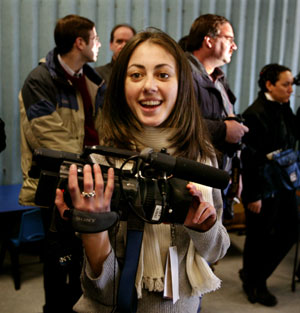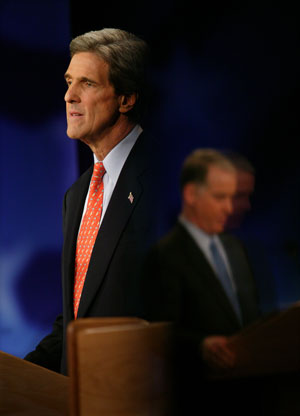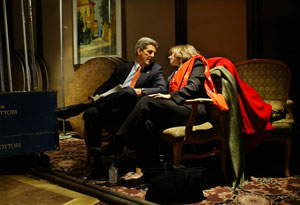 |
 |
Dispatch: It's 25 Below Zero And Some Punk Is Telling Me I Don't Have The Right Credential -- It Must Be The New Hampshire Primary
February 2004
|
 |
||||||||||
|
New Hampshire is a place where some folks' idea of a good time is sitting in a little shack out on frozen lake fishing through holes they cut in the ice. Despite that I go there every four years like clockwork. The Granite State is where the action is politically. I have a lemming-like instinct to head that way when the big hand lands on January at the beginning of each presidential election period. When I stepped off the plane in Boston on my way up to New Hampshire to cover the primaries it was 25 below zero -- without the wind chill. It felt like getting hit by a machine gun firing ice cycles for bullets. I wanted to turn around and head back to my home state of California, a place where January means warmth, surfing, and Germans in bikinis.
During the invasion of Iraq the term "embed" was given to the newsies who were covering specific military units. They ate with them, slept with them, got shot at with them, and gave the rest of the world a pretty good taste of what it was like to be in combat. In the case of the campaigns, the networks have put small video cameras in the hands of some young producers whose job it is to record everything going on and around the major candidates. Alexandra Pelosi, an NBC producer, pioneered that concept during the Bush 2000 campaign, and turned her supposedly personal video diary into an HBO special. What she spawned will probably never be put back in the bottle. Now there are Pelosicams with each candidate, relentlessly recording everything, everywhere. It signals the end of spontaneity and occasional silliness as I remember it. No candidate (or photographer) in his or her right mind will say or do anything stupid for fear of ending up as road kill in another made-for-television political documentary. There were the handlers of the candidate's press entourages, many of whom had been involved with campaigns past, but appeared to have had their memory cards erased when it came to once again handling photographers. One of them was looking out from inside his candidate's bus and complaining about all of the press people gathered at the door. "What a zoo," he said. I pointed out that if there weren't a zoo out there, both he and his candidate would be back at home watching the other animals on television.
Stephan Savoia, ace AP photographer, and a veteran of the political wars, was challenged by an intrusive campaign official who told him he couldn't enter an event without a credential. Stephan, who could be mistaken for a Patriot's lineman, pointed to his face and said, "This is my credential." He got in. David Burnett found a perfect angle at a Wesley Clark event from the platform where Clark was going to speak. He was asked to move by one of the staff who primly suggested that, "You're not the look we're going for." Burnett, revisiting a long-lost era, is back as a contract photographer for TIME, and is doing a bang-up job in the process. Burnett, who could probably use a pack mule as an assistant, is carrying everything from a 4 x 5 Speed Graphic, to a Rolleiflex, to a Canon digital camera. We figured out that we were probably the oldest two photogs on the Kerry campaign plane as we left New England. Maybe so, but longevity doesn't rhyme with lazy -- he is still one of the most talented and hard-working photographers in the business, and his pictures should be an inspiration to upcoming generations of camera wielders. The February 9th issue of TIME has a brilliant Burnett portrait of John Kerry on the cover-made with that good ole 4 x 5. (See David Burnett's Dispatch: Life on the Road with Holders and a Speed).
John McCain, who had beaten George W. Bush in the 2000 primary in New Hampshire, showed up to give a speech supporting the president. McCain, who Howard Fineman calls "catnip for the press," had a big turnout of media, many of whom had covered his earlier campaign. It was hard to believe that was only four years ago. I showed up at one of Howard Dean's first stops in New Hampshire after he had been trounced in Iowa, and made one of the most unusual and bizarre concession speeches ever recorded. He was late arriving at the event, and someone asked where he was. "He probably stopped off to see his exorcist," was the answer. The planes filled with the candidates and their entourages left New Hampshire like a great swarm of migratory birds, some heading south, others west.All seek that elusive prize, the nomination of their party, and possibly a trip to 1600 Pennsylvania Avenue. This time around I completed a hat trick of winning candidates. I was behind the scenes with the New Hampshire winners in 1996 (Buchanan), 2000 (McCain), and 2004 (Kerry). I think I should probably leave well enough alone, and skip the next one, but I know my body's political clock will recognize the sound of that ticking, as the hand prepares to strike January in 2008, and once again I will find myself pulling out the mittens, and searching for my boots.
© David Hume Kennerly
Contributing Editor, Newsweek
|
|||||||||||
|
Write a Letter to the Editor
Join our Mailing List
© The Digital Journalist
|


